Committee chair admitted she “absolutely hated” the prospect of the mixed-use scheme being built
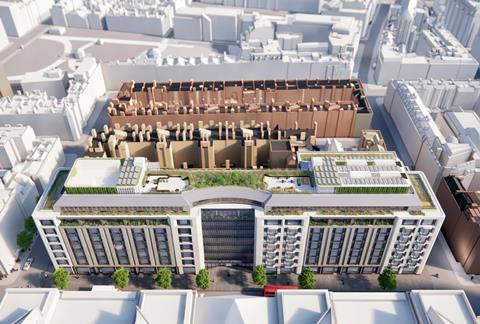
Westminster council’s planning committee has unanimously voted to approve controversial plans by AHMM to demolish and rebuild an entire city block in Marylebone despite several members strongly criticising the mixed-use scheme’s “nondescript” design.
In a three hour meeting devoted entirely to the project, committee chair Ruth Bush admitted she was “deeply disappointed” by AHMM’s design proposals for the site and said she “absolutely hated” the prospect of it being built but voted in favour of the plans due to the borough’s need for grade A office space.
Designed for a joint venture between Derwent London and Lazari Investments with the Portman Estate, the eight-storey scheme would replace a row of five unlisted buildings along Baker Street including the former headquarters of the Special Operations Executive, a government spy agency active during the Second World War.
The proposals, which will still need final sign off by the mayor of London to go ahead, would include 28,000sq m of office space and 17 homes on what is considered the area’s last remaining strategic development site.
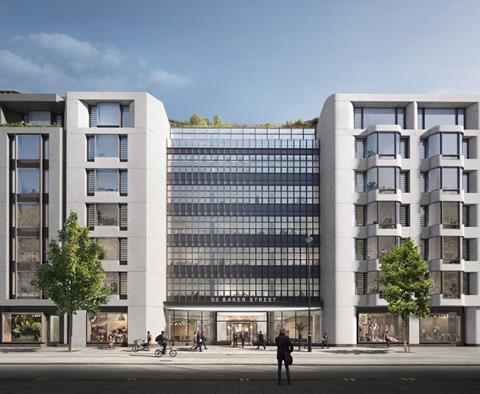
All councillors on the committee voted in favour of the planning officer’s recommendation to approve the application in the meeting, which had been scheduled for a decision in June before it was pushed back due to the serious illness of a case officer.
Bush, criticising the design of the scheme, said her vote to approve came “genuinely with a very heavy heart”.
”I am deeply disappointed by the size and design of this building. I just think the lack of imagination, the lack of sensitivity to what surrounds it… I know we’re being told how it makes appropriate reference to the conservation area but I think these colossal verticals are completely out of place,” she said, referring to a series of large columns proposed for the facade of the building.
> Also read: AHMM’s controversial plans to demolish and rebuild entire Westminster city block recommended for approval
She added: ”I absolutely hate the idea of this building being up there for 50 odd years or more….but every time we make one of these decisions a building stays for decades and it should. This is too big a building to be where it is in the context of where it is.”
Councillor Paul Fisher, who has sat on the committee for more than two years, said the proposal was “one of the most difficult” that he had determined but voted in favour because of the high demand for high quality office space in the Baker Street area.
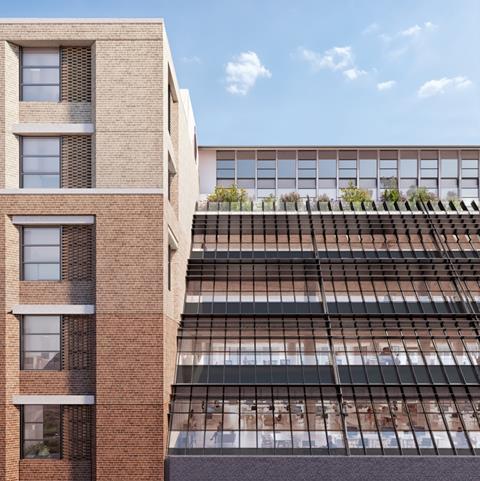
”I don’t like the design. I think it could have done better with the design of this building in the heart of London, but that’s not the test here,” he said, adding: ”all things considered, it would be reckless given the demand for grade A office space for me to reject it”.
Councillor Jason Williams described the proposed building as “rather nondescript and it could be anywhere”, while Councillor Laila Cunningham said also admitted she did not like the design and said it ”could be more refined, more elegant”.
But Cunningham said the current site was not sustainable and would need to redeveloped in the future, and AHMM’s proposals were ”almost as good as it gets in terms of sustainability”, adding: “I fear that a future application may not be”.
Westminster’s planning officers had said the proposals were “acceptable from a sustainability and circular economy perspective” in their recommendation to approve because of the applicants’ commitment to reuse around 59% of Accurist House, one of the buildings on the site. The new scheme would also have significantly better operational energy performance than the existing buildings.
A council report said reusing the buildings would not be viable because of differing floorplates. While the developers had looked at retaining Accurist House, a study found this would have a comparable upfront carbon impact of redeveloping the whole site.
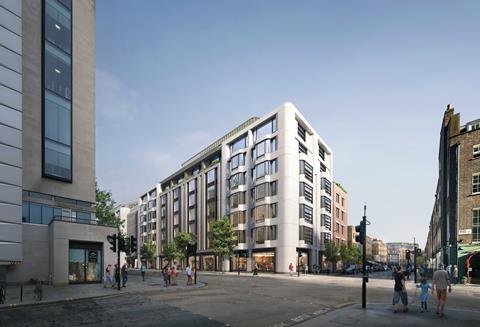
More than 40 letters of objection were sent in by members of the public questioning the scheme’s sustainability and describing the decision for a full redevelopment approach as “based on a pre-conceived commercial position”.
It is the latest in a string of contentious redevelopment proposals which have come before Westminster’s planning committee in the last few months following the council’s announcment of its intention to become a “retrofit-first” city.
A committee hearing in April refused plans by Fathom Architects to redevelop a block on Savile Row despite the scheme being deemed compliant with local planning guidance, while a Foster & Partners-designed retrofit in Mayfair was granted approval at the same meeting.
But another demolish and rebuild scheme on Savile Row by PLP was unexpectedly approved by the committee last month despite the proposals being recommended for refusal by planning officers on heritage and sustainability grounds.
The project team for the Baker Street site includes planning consultant Gerald Eve, landscape architect LDA Design, structural engineer Buro Happold, MEP and services engineer Cundall, cost consultant Aecom and project manager Gardiner & Theobald.



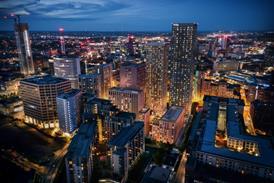
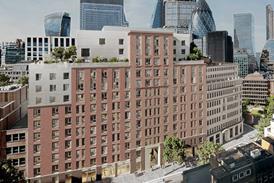
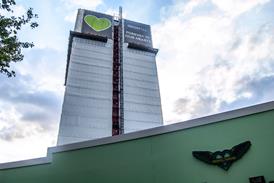










2 Readers' comments